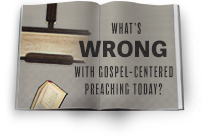“Thou Shalt Not Steal” and Other Sermon Points I Didn’t Make Up: Some Thoughts on Pastoral Plagiarism
A little over ten years ago, I was asked to ghostwrite a book for a famous Christian author. That was when I first woke up to the reality of plagiarism among Christian leaders. I’d heard of ghostwriting; I just didn’t realize how widespread it was until I saw behind-the-scenes of the evangelical publishing world. I wondered: How can professing believers pass off another’s words as their own?
Imagine my shock a few years after that when I first learned that some Christian preachers do the same!
Turns out it’s a rather big thing, more widespread than most churchgoers even know. Just a couple of months ago, a friend asked me for advice on what to do about a pastor acquaintance across town who regularly preaches someone else’s sermons as if they were his own work. There are even some churches and preaching resource services that package sermon content for sale to preachers in need of a message.
Is it really that wrong? Aren’t we all just standing up and leaning into the Word of God which isn’t original to us, anyway? And if someone was helped by the sermon, isn’t that all that matters?
Well, no. Pastoral plagiarism matters because worship in “spirit and truth” (Jn. 4:24) matters. Plagiarized preaching is in fact a big deal. How do we know that?
WHY PLAGIARIZED PREACHING MATTERS
1. Plagiarism is disobedience.
God has commanded us not to lie and not to steal. Passing off another’s work as your own is a disobedience two-fer. The preacher who relies on plagiarized material isn’t just being dishonest, he’s also stealing the hard work of another.
It’s not wise to test God this way. Standing up on a regular basis before his people to declare his truth while engaging in willful dishonesty is a recipe for spiritual disaster. If you take these crooked, lazy shortcuts on such an important element of your ministry as the weekly sermon, other crooked, lazy shortcuts will follow, and likely are already taking place.
2. Plagiarism is potentially disqualifying.
The two non-negotiable elements of the pastoral task are “prayer and the ministry of the word” (Acts 6:4). There are plenty of other important things pastors must do, but these two are essentially what make up pastoring. And a necessary requirement for the office of the pastorate is being “able to teach” (1 Tim. 3:2). This is really the only “skill set” required of the pastor (as all the other biblical requirements speak to character and disposition). Being able to teach is of course a gift, not merely a skill, but the regular and willful sermon plagiarist is bringing his gift and his skill into question.
Being “able to teach” doesn’t simply mean being able to perform. It’s not primarily about eloquence. It’s about being able to rightly handle the word of truth (2 Tim. 2:15). If on a regular basis you’re leaning on someone else’s exegesis, someone else’s exposition, someone else’s personal illustrations, you’re eroding your own credibility to do the work and thus your own qualification to hold the office.
3. Plagiarism is distinctly unpastoral.
This is what I mean: faithful preachers have their congregations in mind when they’re preparing their sermons. They’re praying for their people, as many by name as possible, when they’re reading and meditating on the text. They’re doing appropriate contextualization in their preaching, keeping in mind the specific people and their needs (and concerns and sins and idols) when they’re making application or composing illustrations.
Faithful preachers write sermons for their people. Plagiarists think somebody’s leftovers will suffice. What would you think about the shepherd who relied on someone else’s work to feed his sheep? If he couldn’t be moved to do the hard work of feeding the flock himself, you might think, after a while, that he didn’t actually love them.
Now that you’re good and anxious about plagiarism, how might you avoid it?
HOW NOT TO PLAGIARIZE
1. When in doubt, cite it.
Most preachers understand that re-preaching someone else’s entire sermon is not just dishonest, but also weird. It’s more of the little elements of the sermon that sometimes have the feel of grayness. How do you know when to attribute certain turns of phrases or popular sentiments? If you’re not sure about the source of a particular line or passage, do your due diligence in looking it up. If you know someone originated the phrase but can’t locate the source, at the very least introduce the line with something like, “As someone once said…” or “As they say…”
2. When not in doubt, cite it.
If you know who originated a phrase or portion of your sermon you want to re-create, give credit. Always. Of course, you don’t have to give the publishing date and page number in a pulpit sermon, but nothing is lost at all by introducing that portion with “John Piper writes…” or “R.C. Sproul once said…” Nothing is lost except perhaps a bit of the pride you shouldn’t be coddling anyway. There’s certainly nothing good gained by knowingly passing off another’s words as your own.
This applies to illustrations as well. In some of the strangest examples of pastoral plagiarism I’ve been told about—but never witnessed, as far as I know!—someone will tell me about hearing a preacher tell a moving or funny first-person story and then later hearing the exact same story, in the exact same words, from another preacher, also in the first person! Passing off another person’s actual experience as your own isn’t just lying and stealing, it’s also just downright bizarre. Don’t be a weirdo. If the illustration is really that good and your sermon can’t do without it, say, “I heard Matt Chandler tell a story once about . . .” or something similar. Or better yet, think of an actual story from your own experience that is comparable.
3. Do the work and trust the gospel.
There’s nothing substantially satisfying in passing off another’s hard work as your own. It may “land” well. It may move people. It might generate the laughs, the tears, and the applause you crave, but you know it’s a lie. You didn’t earn any of it. It’s a sham.
How does this happen? Sometimes preachers are led into temptation to plagiarize because of overly busy schedules. They run out of time each week to prepare a sermon and feel cornered by the Sunday deadline. It’s easier to take someone else’s long, thought-out message than cram and crank out their own. In such cases, an overhaul of pastoral priorities may be in order.
Remember that the ministry of the Word is the primary task of the pastor. This means other things may need to take a secondary seat. In some small church or bi-vocational settings, you may need to be diligent to train your church to minister well to each other rather than relying totally on you to be their only supply of ministry. But do whatever you can to prioritize the Word and start as early as you can in preparing the preaching. This is what God has called you to do.
Sometimes, however, it’s not a lack of prioritization or time management that leads a preacher into the temptation to plagiarize. Sometimes, it’s simply their own insecurity. They don’t think much of their own preaching and fear the congregation doesn’t either. Maybe they’ve even been told as much. Setting aside for the moment the possibility that one isn’t qualified to teach, remember that biblical preaching isn’t reliant on eloquence or showmanship (1 Cor. 2:2). It’s not reliant on intellectual elitism or academic displays. It’s reliant on the gospel of Jesus Christ.
So trust the gospel. Work hard at your sermon, doing your work as unto the Lord. Put your heart, soul, mind, and strength into it. Your people are worth your best work. But the impetus to do this week and week out must come from your approved position as a co-heir of grace. If your sense of approval or justification is found in a great performance or in congregational approval or an increasing attendance, you’re setting yourself up for a fall. Trust the gospel to do what you cannot, even on your best day. The gospel is where the power is. Mark Dever, H.B. Charles, and Ray Ortlund might be able to preach the gospel better than you, but they cannot preach a better gospel!
It was James Spurgeon who said that, by the way, about his grandson Charles.









